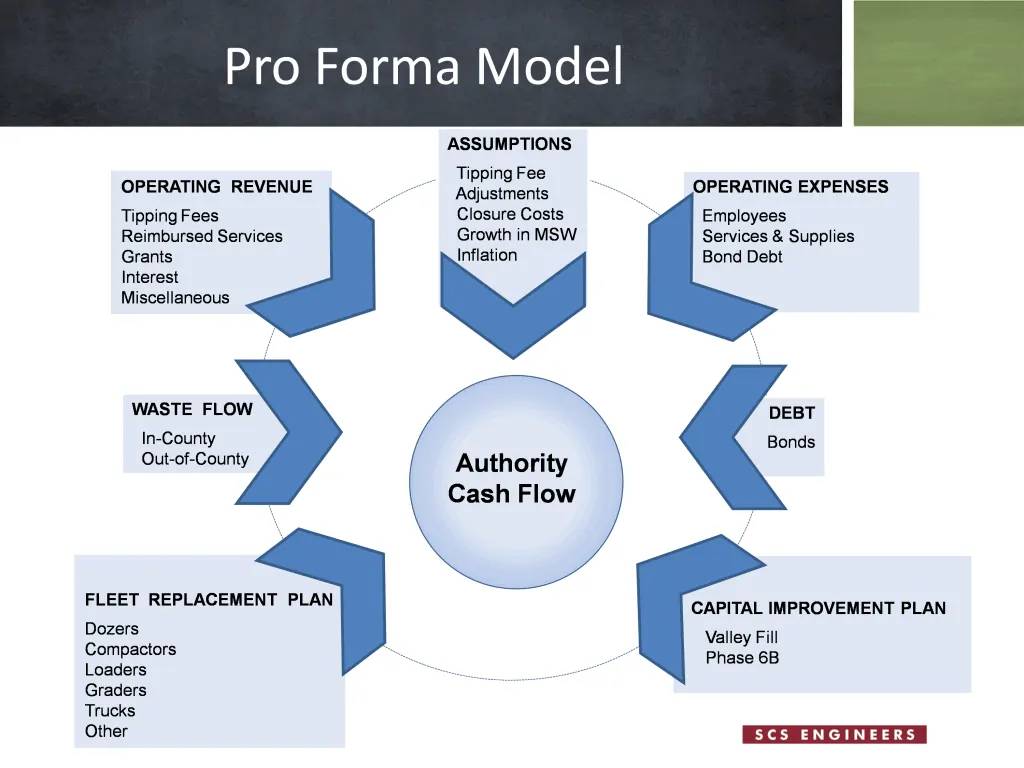

SCS Management Services™ helps many of our clients’ incorporate economic planning, financial analysis, and feasibility studies into their master planning and have requested copies of our articles. All can be found and filtered by topic area, and we are always ready to help you find the information you need.
Our articles may be printed or shared using the icons on the left navigation bar. Or, you may share or email this page to keep it handy. SCS respects your privacy; we do not monitor or collect your email address or information.
Contact Vita Quinn for more information. Ms. Quinn is SCS Engineers’ National Expert on Solid Waste Finance and Rate Studies. She has 12 years of experience as a financial analyst and management consultant. She has extensive experience working for local government and has developed financial sustainability solutions for various general governments, special revenue funds, and utility enterprise funds. Ms. Quinn has an MBA in Finance and a Bachelor’s Degree in International Economics.
 An Exercise in Sound Fiscal Planning: A Rural County’s Public Works Professionals Evaluate Future Solid Waste Service Scenarios, Costs, and Financing Options
An Exercise in Sound Fiscal Planning: A Rural County’s Public Works Professionals Evaluate Future Solid Waste Service Scenarios, Costs, and Financing Options
Residential Automated Collection Makes Sense for Idaho Falls
The Nuts and Bolts of Implementing a Residential Automated Collection Program
Conducting a Rate Analysis as Part of a Master Plan Study in Killeen, Texas
https://www.scsengineers.com/scs-articles/conducting-a-rate-analysis-as-part-of-a-master-plan-study/

Conducting Solid Waste Rate Studies and Business Plans
https://www.scsengineers.com/conducting-solid-waste-rate-studies-and-business-plans/
Get a Firm Handle on Solid Waste Costs to Optimize Performance
https://www.scsengineers.com/get-a-firm-handle-on-solid-waste-costs-to-optimize-performance/
Cash Flow Analysis Forestalls Long-Term Debt
Is Privatization the Answer? You Need to Consider Several Factors Before Making the Decision for Solid Waste Services
https://www.scsengineers.com/publications/articles/page/11/
Developing a Strategic Business Plan for Your Agency
Economic Feasibility 101 – Understanding the Tools of the Trade
Assessing a Solid Waste Agency’s Financial Health
Are Your Rates Correct? Collection and Disposal Rate Studies are a Valuable Tool
Integrating Financial Analysis into Solid Waste Operations Planning

Recycling Trends in the United States
https://www.scsengineers.com/scs-articles/6555/

Anaerobic Digester Economics
Give SCS a call or send an email to if you have questions. Find your local office here: https://www.scsengineers.com/locations/. Visit our Solid Waste Planning Services page for additional information, articles, whitepapers, and case studies.
Operational expenses such as replacing collection vehicles, considering and implementing recycling programs, and the impact of stricter environmental regulatory programs can all affect collection fees and the quality of service. Strategic business planning solves the ongoing process whereby an organization determines where it is going… plus how it will get there, and what tools and resources it will use.
The City of Killeen recently worked with SCS Engineers to create a 20-year master plan with modeling capabilities to determine the optimum scenarios that benefit the surrounding communities and one that helps manage environmental safety and the outlay of capital before the expense of planning, designing, and building begins. Population projections, demographics, cost and historical data, among other resources, make up the information that is then organized and analyzed to prepare projections based on changing scenarios over a period of years. This type of economic study enables the planning team on any proposed project to provide a “what if” analysis for the decision-makers with the potential impact a proposal may have on customer rates and fees.
The collaborative effort between the City and SCS has culminated in a long-term financial roadmap and planning tool, which evaluates the impact of operational expenses and provides a basis for planning capital expenditures. The plan is already in use by the City’s decision-makers to determine the efficiency of investing in equipment and a Material Recovery Facility (MRF) as part of a waste management plan. Key outputs of this study included the justification for the City’s acquiring new collection equipment and further assessment of the feasibility of implementing single-stream recycling.
This type of business analysis requires technical expertise in the many aspects of waste management. You’ve got to dig deep into the conditions that present a financial, environmental, or quality challenge to managing wastes in order to deliver a system that is serviceable for decision-makers to use for many years.
Solid waste agencies are under more pressure these days to provide high-quality waste collection, facility enhancements, and landfill operation services. Coupled with the pressures from ratepayers and local government “lean and mean” initiatives to keep rates and expenses low, has many solid waste agencies struggling. Balancing real cost escalation factors such as rising fuel, material, and labor costs against the push for keeping static rates is challenging. Further, full cost accounting is difficult because agencies often support activities not directly related to normal operations or provide “free services” such as street sweeping or collection and disposal for community events (i.e. fairs, farmers markets, runs for charity, art shows). Allocating shared costs across agencies is complicated and at times inaccurate adding to the agency’s overhead.
The scarcity of reliable data available to benchmark solid waste management operations handicaps timely comparisons among solid waste systems. Benchmarking rates or service fees for collection and disposal is challenging, but not impossible using financial tools now considered critical to focus on an agency’s primary policy and management issues. These tools are the basis for budgeting, cost accounting, financial monitoring and evaluation aimed at recovering sufficient money to cover recurrent operational expenditures of the agency’s services as well as to stock up capital for new investments or extensive maintenance.
A Pro Forma Model is a financial tool crafted from the market dynamics influencing the life cycle of a specific project, cost center, or program. In the solid waste business, every project is unique, and the design of the pro forma financial model should reflect these differences. To accommodate the various types of business models needed to analyze the feasibility of recycling projects, we’ve developed different types of pro forma models that allow us to tailor the financial statements to the particular project. Thus, each client receives models that have the maximum flexibility to model multiple scenarios of facility size, energy production/co-generation, site locations, and changes in operations.
For example, we have had clients wanting to evaluate the feasibility of a single stream recycling program with multiple cart sizes, evaluate alternative landfill cover systems, and collection equipment and whether or not a change from manual to automated collection made long-term economic sense.
Another client, a private waste hauler, wanted to evaluate the business case for implementation of a leachate evaporator. The cost of leachate disposal was increasing, and our client needed to make a business case for the project. In each of these cases, a pro forma model was developed to help quantify the capital and operating costs of the proposed facilities or programs and then compare these long-term costs against current programs.
The use of financial tools to evaluate the agency’s cost of service is another important area where pro forma modeling is used. Such cost of service studies evaluate the financial aspects of solid waste management programs and remain critical to ensuring sustainability of the agency. In short, these studies show how an agency determines the means to fill the gap between cost and revenues, alert authorities to options of how financial sustainability can be improved, and determine if privatizing some services is a reasonable option.

The lack of specific financial monitoring and analysis of data is one of the significant barriers to being able to sustain any envisioned improvement of an agency system. This concerns budgeting, cost accounting, financial monitoring and evaluation aiming at recovering sufficient money to cover recurrent operational expenditures of the collection service as well as to stock up capital for new investments or significant maintenance. Many agencies do not know the actual cost of providing specific services. Before strategic decisions are made, an important step is to establish a full understanding of the historical or current costs for the provision of the services and the respective revenues. The studies serve to project financial sustainability in the short-term as well as in the long-term.
The growing national trend toward privatization of government-provided services demonstrates that the public sector solid waste agencies must operate efficiently and cost-effectively if they wish to continue providing these services to its citizens. Municipal governmental agencies must optimize the performance of their service utilities to ensure that costs are contained; while at the same time, service levels and customer satisfaction remain high. In fact, it is necessary for public agencies to think and act like the private sector service providers and spearhead efficiency gains and identify cost reduction measures to reduce operating costs while improving customer satisfaction.
In conclusion, the use of financial tools to evaluate current and proposed solid waste programs and facilities is an increasing trend across the nation by many solid waste agencies. These tools provide a useful vehicle for finding optimal management solutions, while at the same time, providing quick answers on their projected financial performance for political decision-makers.
Contact Marc Rogoff, the SCS National Expert on Solid Waste Rate Studies or read more about using financial tools to balance current and future rates while planning for high-quality waste collection, facility enhancements, and landfill operation services.
Economic Feasibility 101 – Understanding the Tools of the Trade, in MSW Management
Solid Waste Planning, City of Killeen, Texas, in Waste Advantage
Regional Waste Management Authority Uses Pro Forma Model for Short and Long-term Operational Excellence and Budgeting, an SCS Blog